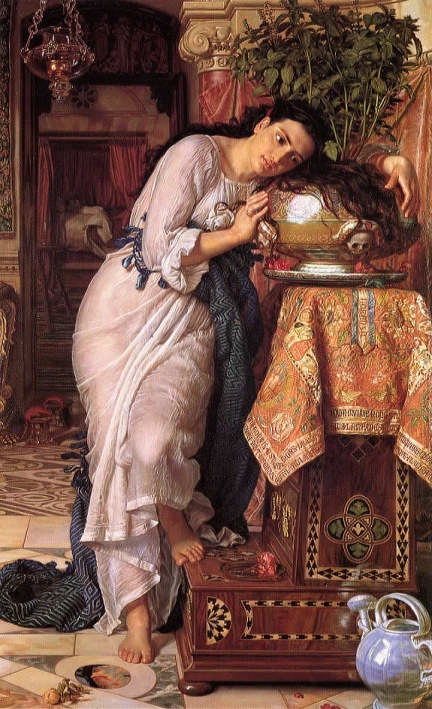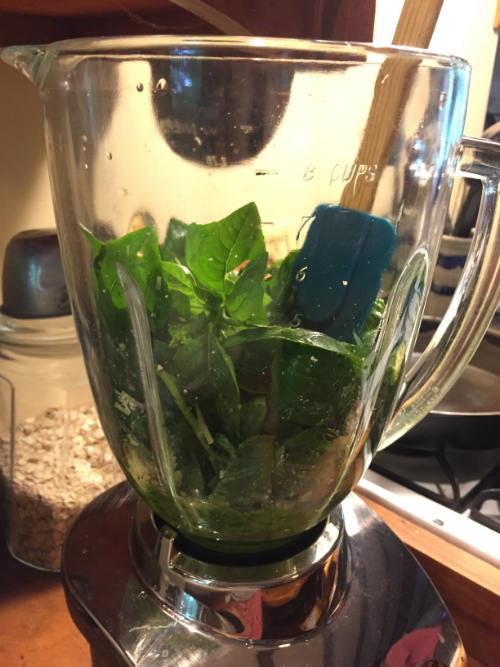Basilico~Sweet Basil Magick
“Where Basil grows, no evil goes” ~Old Adage
“Make sure and add some basilico!” Was a common phrase in the kitchen on Sunday at my grandparent’s house when I was growing up. Basilico is the Italian word for Basil. Whenever someone came to visit in the summer they would ask, “How’s your garden this year?” This meant, “Give me a garden tour so I can make sure you’ve planted your tomatoes and to see if they look as good as mine.”
After a thorough tomato inspection the next question was, “Where is your basilico?!” My Italian family members always wanted to see the garden, and the elders, specifically my grandfather and great-uncles, were always adamant about seeing the garden and inspecting the contents. Everyone grew some traditional Italian food even if it was just a couple of tomato plants growing in pots on the front porch. Even when my grandparents moved to the Adirondack Mountains, where the soil is sand and rock, they turned and toiled the land next to their little cabin enriching the soil and installing deer fences so they could plant basil and tomatoes.
Growing tomatoes, basil, and parsley was part of honoring and respecting my family and our Italian heritage.
I knew this because of the way my father would jump over to his basil patch and present it to our family visitors with his palms up, hands in full presentation gesture, and proudly exclaim, “It’s right here!”
My father turned two-thirds of our little city backyard into a garden. At one point, during a stifling hot and humid upstate New York summer, I asked for a backyard pool and my Dad just bluntly said “there’s no room.” It was true.
Me and my Dad in the backyard. Basil plants are right behind us.
Ocimum basilicum, Basil, Sweet Basil, or as my father says Basilico (which sounded to me like Basil-LEE-gol) is a commonly known cooking herb that is used in numerous, if not all, Italian cooking recipes.
It is also an ancient medicinal plant found in apothecary cupboards worldwide as well as in almost every herbal materia medica published now and throughout history. Basil is native to India and Asia and Ocimum sanctum, also known as Tulsi or Holy Basil, is a sacred plant in the Hindu tradition.
The word “basil” is from the Latin basillicum and Greek basilikon meaning royal or king. Also, Basil associated with the word basilisk. The basilisk is a mythical serpent from Roman legend and the Basil plant is said to be the antidote for its venom.
The earliest accounts of Basil's attributes are associated with anger and hatred and, in some accounts, it was believed that Scorpions would grow wherever a Basil leaf was placed. It was considered a fiery plant and was often incorporated into myths about Satan. This may be how it came to be known as Devil Plant. The Greeks and Romans believed that in order for Basil to grow properly you had to curse and yell while planting it's seeds.
Basil has, alternately, been associated with love and it became the feature of folklore and story when Giovanni Boccaccio wrote about it as a balm for lost love The Decameron. This story inspired the poem “Isabella and The Pot of Basil” by John Keats where he describes how Isabella, when finding out about the murder of her lover Lorenzo, unearths him and buries his head in a pot of Basil plants. Basil has often in myth and folklore been associated with love and death and it has been referred to as the plant of "love washed with tears." The death aspect corresponds to the Mediterranean ritual of placing basil in the hands of the dead to protect them on their journey to the Otherworld.
Isabella and the Pot of Basil, William Holman Hunt
Sweet Basil is an ancestral plant from my own ancestral tradition of Italian witchraft where it continues to be used by witches and plant healers. It has been said that witches drank the juice of basil before they took flight. This is likely because of its protective properties as well as it’s use on the bridge between life and death.
Basil has long been known as an herb to invoke love and activate love spells.
This aspect in modern terms is not about coercing someone into an otherwise unwanted love relationship. It more accurately eases the emotional heart of deeply held trauma and grief that may be stuck or stagnant making movement and the processing of emotions difficult. This stagnation and lack of dynamic motion can become an obstacle to the reception and generation of attraction as well as the ability of the heart to be a vessel for the reciprocal and reflective exchange of love. Basil stimulates the motion and flow of emotions through the sacred heart so that they may be resolve, integrated, and embodied allowing the heart to regain full capacity and thereby give and receive love and become open to romantic relationship.
It is from this that Basil is magickally known as an herb of attraction. Basil is used in spells to attract wealth, abundance, customers in business endeavors, inspiration, and joy by alleviating our internal blocks to receiving such blessings.
Planetary Correspondence
According to Nicholas Culpeper, Basil is ruled by the planet Mars and inhabits the sign of Scorpio. Scorpio, was ruled by mars until the discovery of the planet Pluto, and it still carries a martian energy pattern. Mars rules conflict and war, the fire and impetus necessary for conflict resolution, and the innovation and creativity that often occurs as a result. Culpeper also says that “it helps the deficiency of Venus in one kind, so it spoils all her actions in another.” This is a bit contradictory and confusing and may be referring to Basil’s (and Mars’) polarized nature as both a plant of death and life, hate and love, elimination and abundance.
“For as by Basil the scorpion is engendered, and by the means of the same herb destroyed, so love which by time and fancy is bred in an idle head is by time and fancy banished from the heart.”
Tarot- The Empress
Basil has been associated with a few different tarot cards including Strength, The Tower, The suit of Wands, and the suit of Swords. Coming under the rule of Mars these comparisons seem reasonable, particularly from a patriarchal perspective in a warrior/martial society. But the forces of fire and confrontation, as embodied by the planet Mars, are also the raw materials needed to spark creativity and inspiration.
The Empress, and most feminine archetypes and goddesses, have over the eons taken on a patriarchal overlay that reduced their influence upon the living world to fertility and mothering. Fertility and mothering are by no means inferior attributes to any other, but do not portray the full spectrum of the abilities of the Empress that include the transformative element of fire portrayed as a martial goddess or warrior queen. The legend of St. Helena, Empress of the Roman Empire portrays a much more empowered empress that could read the signs, knew the language of the plants, and had the agency to act on her inner wisdom.
Roman Empress Helena
The legend of the Empress Helena, also known as St. Helena or St. Helena of the True Cross, is a story of the mother of Roman Emperor Constantine the Great (reign 306-337 C. E.) Helena was herself known as the “Warrior Queen", with her own army and entourage of priests accompanying her on a pilgrimage to Palestine to recover lost sacred Christian sites. During the process of her exploration, she uncovered the “true cross” of Jesus Christ. Legend varies but, it is said, she was attracted to a strong fragrance that led her to a hillside covered in Sweet Basil plants. Some versions tell that this was the site where a temple dedicated to the goddess Venus was demolished in order to build Constantine’s church. It was beneath these ruins that she discovered pieces of three crosses. The Empress divined the True Cross by bringing a sick woman to the site and having her touch each cross until she was healed by one, the True Cross. This empress held a great deal of autonomous political and military power as well as an immense amount of persistence and resolve. She is also acclaimed to have used the wood of it to heal others that were sick and ailing.
The Empress here, as represented by St. Helena, was a symbol of feminine power, divination, healing, and prowess.
Basil as Oracle
When Sweet Basil comes into our lives or when we are in need of it is time to move and release internal obstacles to abundance. If we have grief from love lost or heartbreak that we have resisted feeling, Basil can invoke the fire or inspiration, as well as confidence we need to allow the pain of loss to flow, resolve, and integrate as a natural consequence of being alive. It may mean that it's time to take initiative actualize our own autonomy. It can also mean that we need to address an issue with clear and direct communication. As a plant that falls under the rule of Mars, we may need to confront something whether within or without and transmute it into a force of creation rather than conflict.
An old folk use of Basil from the Middle Ages was to divine the chastity of a woman by placing a Basil leaf beneath her bowl. If she ate her meal it meant she was chaste.
Medicinally, Basil has anti-inflammatory and antibiotic properties, improves digestion and is used in indigenous Italian folk medicine as a facial steam resolve headaches. It can be taken as a tea, tincture, or included in cooking recipes.
Basil Pesto
A colander full of Basil
A handful of fresh Parsely
2-4 cloves of fresh garlic
4 tablespoons of melted butter
Olive oil
½ -1 Cup of Parmesan cheese
½ Cup of Walnuts, Pine nuts, Almonds or other nuts. I sometimes use a combination
In a blender add the Basil. I primarily use the leaves but do add the tender stems as well. Buds and flowers are fine to add too but I generally keep my Basil “pinched back” because this encourages them to grow more leaves. Add stemmed parsley, butter, nuts, parmesan, garlic and some olive oil. The olive oil effects the consistency and how well the other ingredients spin in the blender. I start with probably ¼-1/2 cup of oil and add more if I need to. Turn the blender on and off to stir. Depending on what kind of blender you have you may have to do this several times and use a spatula (while the blender is turned OFF or you'll end up with spatula in your pesto) to turn the blended ingredients up from the bottom and push the top ingredients down. The consistency you want is based on how thick or thin you like your pesto but you want it to be thin enough to smoothly cover pasta.
And that’s it! Add pesto to pasta, pizza, or to tomato sauce!
Basil Magick
Place a sprig of fresh Basil, or dried Basil in a bag, in your wallet to attract financial abundance
Place a sprig, or sprinkle dried, on your desk or near your computer to attract business
Burn as incense for protection
Wear a sprig as an amulet to strengthen and clear the emotional heart
Drink a cup of Basil tea daily to release lost love and invite in new love
Links and Sources:
Isabella and The Pot of Basil by John Keats
Basil on Witchipedia
The Complete Herbal & English Physician by Nicholas Culpeper
Southern Italian Folk Medicine: "Folk pharmaceutical knowledge in the territory of the Dolomiti Lucane, inland southern Italy", Journal of Ethnopharmacology, 95 (2004) 373–384
Essential Herbal Wisdom: A Complete Exploration of 50 Remarkable Herbs, By Nancy Arrowsmith








